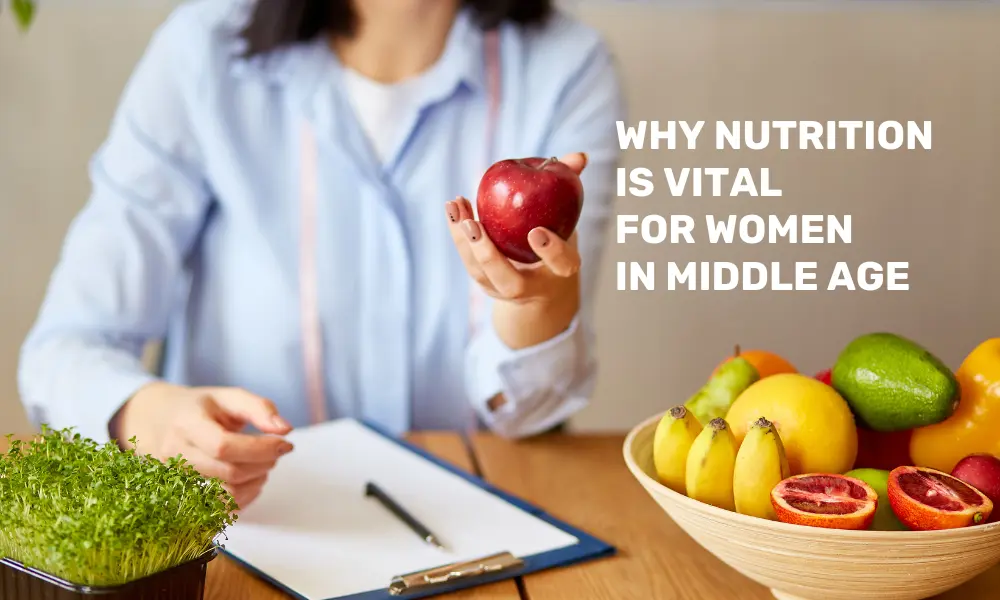With growing age, women’s bodies undergo many biological changes. One such change is the onset of menopause, a natural biological process. At this time, it is vital for women to address their bodies’ nutritional requirements. Lack of Nutrition may have an adverse impact on health.
Effect of Menopause on Women’s Body
Menopause may occur in women in their late 40s to early 50s, and during this time, the monthly cycle gradually stops. During this time, there is a huge hormonal change in women that involves a reduction in estrogen and progesterone levels.
Due to these changes, women may experience a lot of physical and emotional changes, which may include:
-
Hot flashes
-
Sudden mood swings
-
Sleep disturbances
-
Fluctuation in weight
-
Changes in metabolism
-
A decrease in bone density may increase the risk of osteoporosis.
Importance of Nutrition at this phase of Life
A woman’s body requires good nutrition during her midlife because this will help the body overcome all the menopausal symptoms. And strengthen the body and prepare for old age. Here are some useful tips for healthy nutrition for women during this phase:
Calcium: Calcium absorption decreases after menopause due to lower estrogen levels. Thus, it is good to have a diet rich in calcium before menopause to ensure a good store of this essential nutrient to support women through the next phase. Leafy greens, dairy products, fortified plant-based milk, and seafood like salmon and sardines are excellent sources.
Vitamin D: This vitamin has a vital role in calcium absorption and bone health. Spending time in sunlight and consuming fish, mushrooms, sun dried tomatoes, egg yolks, and fortified foods can help meet vitamin D needs.
Healthy Fats: Women must include healthy fats like avocados, nuts, seeds, and olive oil. These are important for heart health and hormone production. Further, healthy fats they may prevent weight gain.
Whole Grains: Women must include whole grains like brown rice, quinoa, and whole wheat over refined grains. Millets are also one good option. They provide more nutrients and fiber, that supports digestive health and helps manage weight effectively. Whole grains also help to maintain a healthy gut microbiome, which in turn aids in digestion and good health.
Lean Proteins: Women must include lean protein sources like poultry, fish, beans, lentils, and tofu. This may help maintain muscle mass, support metabolism, and provide a sense of fullness. Midlife and menopause are associated with a change in body fat distribution and lower muscle mass (carcinogenic). Thus, a diet rich in protein, along with weight-bearing exercises, can help control weight fluctuation.
Hydration: Staying hydrated is important for everyone. Our body needs fluid for smooth digestion, and it prevents dehydration. Women must consume plenty of fluids and water during the day.
Avoid Processed food and added sugar: Women in their middle age must avoid intake of processed foods and foods high in added sugars. These foods are zero nutritional value and can cause high blood pressure, weight gain, and heart conditions. Processed and sugar-rich foods can also affect the skin.
Moderate Caffeine and Alcohol: Excessive caffeine and alcohol consumption can lead to symptoms like hot flashes and disrupt sleep. Women must avoid alcohol or caffeine consumption and consider alternatives like herbal teas. It is also important to quit smoking.
The Bottom line
The transition into menopause is inevitable, but what can be controlled is the adverse impact that it may have on our body. Women may reduce the impact of hormonal change by having a balanced and nutrient-rich diet, as this can help in supporting bone health, controlling weight gain, blood sugar management, and maintaining good heart health. However, diet is just one aspect; for overall well-being, it is important to have an active lifestyle that includes stress management. For a customized diet, CLICK HERE.
FAQ on Nutrition in Women
Why is nutrition important for a woman?
The right nutrition boosts energy levels, reduces risk of certain diseases, like heart disease, stroke, diabetes and helps to maintain weight.
What should a female eat in a day?
Its best to have lean protein, whole grains, millets, lots of vegetables, and coloured fruits. One must avoid processed food and products with added sugar.
Which food is good for women’s health?
Food rich in fibre, calcium, vitamin D and other nutrients is important, One must have foods with healthy fats like avocados and include lean protein.




